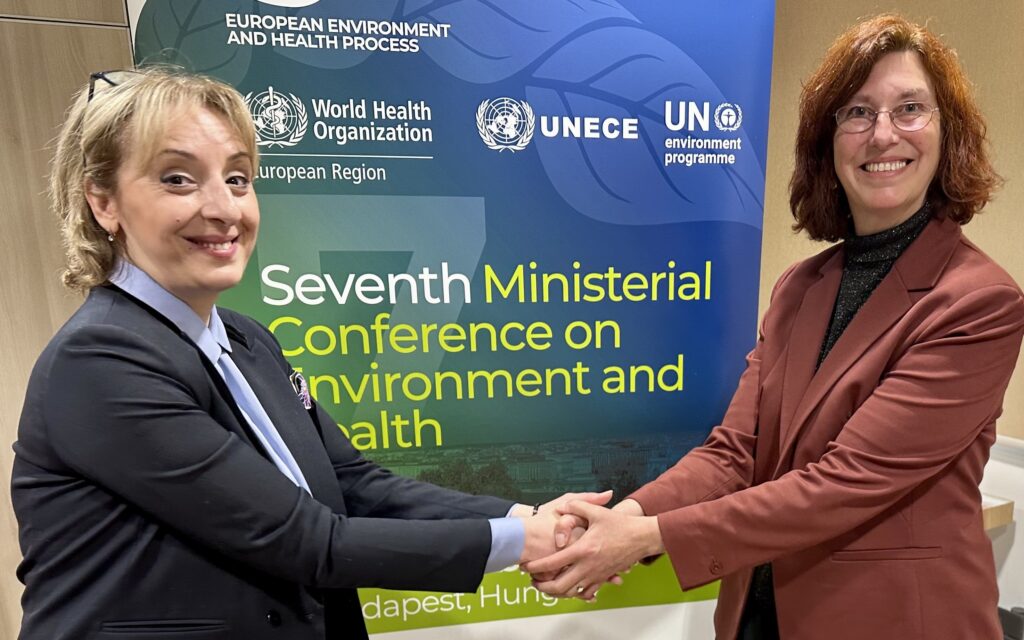HEAL welcomes the call from 250 scientists urging the European Commission to follow scientific recommendations and include provisions to account for the effects of chemical mixtures to better protect health in the upcoming revision of REACH, the EU’s regulation for chemicals.
 WHO Europe Director Nina Berdzuli and HEAL Executive Director Genon Jensen exchange on stepping up and setting the bar high when it comes to protecting health & environment at the briefing.
WHO Europe Director Nina Berdzuli and HEAL Executive Director Genon Jensen exchange on stepping up and setting the bar high when it comes to protecting health & environment at the briefing.
Ahead of the recent meeting of the WHO European Environment and Health Task Force, a briefing was held by the permanent representation of Hungary to the EU, where HEAL Executive Director Génon Jensen discussed HEAL’s perspectives on priorities and expectations from civil society. She called for action ahead of the Seventh Ministerial Conference on Environment and Health and offered a menu of issues that require ambitious and urgent policy action on environment and health in Europe, and in which the EU is poised to take a leadership role for the European region, as part of the implementation of the EU Green Deal, with its objective of zero pollution and do no harm at its core.
She encouraged countries to bring their health and environment ministers and a high level commitment in addressing the triple crisis of climate, pollution and biodiversity loss and the overall objective of accelerating action for healthier people, a thriving planet and a sustainable future to the Ministerial Conference.
“As part of civil society, HEAL, our members and many other NGOs, are here to act as watchdogs, and as partners in building this more health protective approach for our communities today and tomorrow.”
She shared HEAL’s top line advocacy messages that they EU can deliver on for environment and health in the coming months:
- Clean air for all. Europe’s burden from air pollution is unacceptably high, and largely preventable. The Ambient Air Quality Directive revision needs to be advanced, to fully align EU’s air quality standards with WHO recommendations and the latest science by 2030, which will also help reach climate targets. Studies show that children are particularly at risk from air pollutants, even before they are born. Everyone will benefit from these actions, especially the majority of Europeans living in cities and those faced with health inequalities.
- Urgent and ambitious implementation of the EU Chemicals Strategy for Sustainability (CSS) is key in preventing diseases and supporting Europe’s Beating Cancer Plan. The classification, labeling and packaging of chemicals (CLP) draft law, which provides hazard classes for both suspected and known EDCs, is now in the EP and Council and we look forward to a swift adoption. For REACH, the EP and member states must keep up pressure for the the EU Commission to launch the revision by June, in order to have a first reading before the EU elections. The EU needs to commit to a health- and environment-protective reform as promised in the CSS, for CLP and REACH.
- Per and polyfluorinated alkyl substances (PFAS), also known as forever chemicals, stay in the environment and bodies for a very long time. PFAS are associated with health problems, such as liver and testicular cancer, and high blood pressure. The EU and member states should support a broad and protective restriction on all non-essential uses of PFAS.
- Sustainable Use Regulation of Pesticides (SUR) which is currently under consideration by the European Parliament and Agricultural Ministers. The SUR is a key tool to safeguard food security, biodiversity and support the transition to a just and environmentally conscious food system. There is a clear need for swift and significant pesticide reduction, as well as adequate buffer zones around those areas where pesticide use is already banned. The EU also needs to deliver on its promise to stop exporting banned pesticides.
“During the COVID-19 pandemic, policy-makers made health protection the top priority. As Europe emerges from the pandemic, we look to decision-makers to apply this commitment to safeguard our lives and prevent disease through EU policies, and to strengthen binding laws and actions, which will help us beat pollution today to prevent disease tomorrow, for everyone, everywhere in the European region.”
Genon K. Jensen, HEAL’s Executive Director


